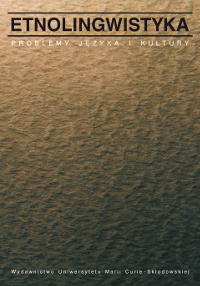Экспериментальный подход в портретировании концептов сферы свой/чужой
THE EXPERIMENTAL APPROACH TO THE PORTRAYAL OF CONCEPTS IN THE 'OWN (US) / FOREIGN (THEM)' DOMAIN
Author(s): Vladislava ŽdanovaSubject(s): Language and Literature Studies, Applied Linguistics, Psycholinguistics
Published by: Wydawnictwo Naukowe Uniwersytetu Marii Curie-Sklodowskiej
Keywords: ASSOCIATIVE AND COGNITIVE TESTS; HIERARCHY OF VALUES ; RUSSIAN FATHERLAND AND PATRIOTISM
Summary/Abstract: This paper discusses possible criteria for the choice and testing of experimental stimulus-words, pointing to a general algorithm for the construction of associative and cognitive tests. The results of such experiments serve as the basis for a description of the domain OWN (US)/FOREIGN (THEM). The paper is based on reactions to the Russian stimulus-words 'patriotizm' (patriotism) and 'rodina' (homeland). In September 2001 associative and cognitive tests were carried out with approximately 100 students of the philological faculty of the Moscow State University (MGU). In the association experiment the informants were asked to give their spontaneous reactions to 30 lexemes. In the second, cognitive experiment, they were asked to define the lexemes in their own words. The analysis of the results of the experiments allows one to draw the following conclusions: both 'rodina' and 'patriotizm' are closely connected with the Second World War, which results from the patriotically-oriented school education. On the level of consciousness, a positive or neutral conceptualization of 'patriotizm' was predominant. One fifth of the answers in the cognitive test lacked a personal, subjective understanding of 'patriotizm'. 31% of the reactions in the associative experiment and 24% of the answers in the cognitive experiment showed a skeptical or even openly negative relationship to 'patriotizm', many of the informants treating it as an anachronism or something dependent on social stability. Similar results were obtained for the lexeme 'rodina'. The similarities with regard to the thematic choices and quantitative relations of the reactions to both 'rodina' and 'patriotizm' clearly point to a close connection between these words in the associative network in the linguistic awareness of native speakers of Russian. It is also an indication of a close distance of the concepts in the hierarchy of values.
Journal: Etnolingwistyka. Problemy Języka I Kultury
- Issue Year: 15/2003
- Issue No: 15
- Page Range: 81-95
- Page Count: 15
- Language: Russian

